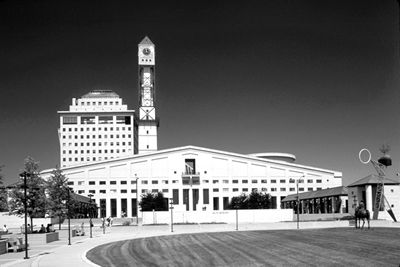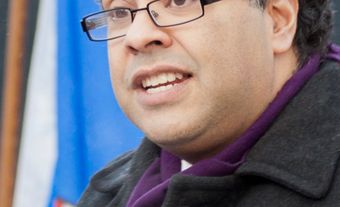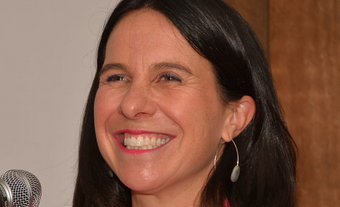Hazel McCallion (née Journeaux), CM, OOnt, businesswoman, athlete, politician, mayor of Mississauga 1978–2014 (born 14 February 1921 in Port Daniel, QC; died 29 January 2023 in Mississauga, ON). One of Canada's longest-serving mayors, Hazel McCallion led her city for 12 consecutive terms. She retired at age 93. Nicknamed “Hurricane Hazel” for her brash political style, she oversaw the development of Mississauga from a semi-rural bedroom community into the sixth-largest city in Canada. McCallion is considered a trailblazer for women in politics. She was appointed to the Order of Canada in 2005 and the Order of Ontario in 2021.

Early Life and Career
McCallion was born in 1921 in Port Daniel, a small town on Quebec's Gaspé Peninsula. She was the youngest of five children of Herbert Journeaux, who owned and operated a fish processing plant and general store, and Amanda Maude Journeaux, the first formally trained nurse in their town.
McCallion left Port Daniel at age 16 to finish high school in Montreal. She went on to attend secretarial school and landed her first job at the Louis Rolland Paper Company in 1940. McCallion was later hired as an office manager by the engineering firm Canadian Kellogg. She moved to Toronto when the company relocated its headquarters there in 1943.
Women were still a rare presence in the workforce, particularly outside traditionally “female” jobs in the service industry. But McCallion continued to assume more responsibility at Kellogg. She was often sent to head office in New York to represent the Canadian branch and negotiate on its behalf. McCallion was considered so essential to the company that it blocked her efforts to join the Wrens (Women’s Royal Canadian Naval Service) during the Second World War. She credited her business experience with giving her the skills for political life and preparing her to work alongside a male-dominated city council.
While still in Montreal in 1940, McCallion had turned a lifelong love of hockey into a professional pursuit. She tried out for the women’s professional hockey league and was accepted on a team sponsored by Kik Cola that paid her five dollars per game. Five-foot-three McCallion was a “fast skater and hard shot,” according to the Montreal Star. She once lost two teeth after taking a stick to the mouth. She played two seasons before moving to Toronto, where there were no professional hockey teams for women, ending her hockey career.
Hazel met her husband, Sam McCallion, through the Anglican Young People’s Association in 1945. The couple married in 1951 and moved to Streetsville, Ontario, then a village northwest of Toronto that would later become part of Mississauga. The couple had three children. Sam McCallion was diagnosed with Alzheimer’s disease in the early 1990s and died in 1997.
Entry into Politics
In 1963, McCallion left Kellogg to join her husband’s printing business and work as editor and business manager of the Streetsville Booster, a community newspaper Sam McCallion founded. It was around this time that she began to pursue public life. By 1966, she was chair of Streetsville’s planning board and president of the local Chamber of Commerce.
McCallion was concerned about the approach to development in the town, which she believed lacked a strategic vision. Strategic municipal development was top of mind for many Ontarians at this time, as the province sought to create regional governments. As part of this policy, it amalgamated the nearby villages of Clarkson, Lakeview, Cooksville, Erindale, Sheridan, Dixie, Meadowvale and Malton — but not Streetsville or Port Credit — into the Town of Mississauga in 1968.
In December 1969, McCallion was elected mayor of Streetsville. She ran on a campaign of maintaining Streetsville’s independence and proposed expanding its borders by annexing surrounding land. She continued to oppose the province’s amalgamation plans but was ultimately unsuccessful. Streetsville and Port Credit officially became part of the City of Mississauga in January 1974. McCallion served two terms as a Mississauga councillor before running for mayor.
36 Years in Office
McCallion was elected mayor of Mississauga in 1978. She ran a shrewd campaign against the incumbent Ron Searle, whose slogan was simply, “A Good Mayor.” Two weeks before the election, McCallion released her own slogan: “A Better Mayor.”
McCallion envisioned Mississauga as a viable city where residents could both live and work, rather than as simply a bedroom community for Toronto commuters. She wanted to create new jobs, and increase the number of commercial and industrial developments. Ideologically, McCallion described herself as a defender of fiscal restraint, stating: “I spend the taxpayers’ money the way I spend my own, which is seldom.” She believed that growth should pay for itself and imposed lot levies on developers. Through these fees, she kept taxes low and Mississauga out of debt for 33 years. The city’s debt-free streak was broken in 2012, when it took out a loan of $450 million to fix aging infrastructure.
Under her leadership, Mississauga grew from a collection of small towns and farmland into the sixth-largest city in Canada. The population nearly tripled and the rapid pace of development transformed the area. McCallion recounted that in the early days of her mayoralty, she could look across the street from the old city hall and see “cows and horses grazing in the field.” Mississauga’s new city hall — an award-winning feat of postmodern architecture — opened in 1987.
As Mississauga expanded under McCallion’s leadership, the city became emblematic of urban sprawl — low-density, car-dependent residential development — and she earned the derisive media nickname, the “Queen of Sprawl.” She opposed intensification for decades but later became an unlikely proponent of “smart growth,” which encourages pedestrian and transit-friendly growth and discourages new development on the edges of the city.
Though McCallion’s detractors said she stifled debate and did not tolerate criticism, her leadership style resonated with voters. She was acclaimed back into office in 1980 (with no mayoral opponent); re-elected in 1982 and 1985; acclaimed in 1988; and re-elected in 1991, 1994, 1997, 2000, 2003, 2006 and 2010. From the early 1990s onward, she garnered more than 90 per cent of the vote, despite not running official campaigns. (At the same time, most Mississauga residents didn't vote; turnout in the municipal elections usually ran between 20 and 35 per cent.)
“Mississauga Miracle”
Early in her mayoralty, McCallion oversaw what was then the world’s largest peacetime evacuation. On 10 November 1979, a Canadian Pacific freight train derailed on the city’s eastern edge, with 24 cars — many of them carrying explosive material — leaving the tracks and exploding into a massive fireball. Of greatest concern were tonnes of deadly chlorine gas that began leaking from one of the cars. (See also Railway Safety.) McCallion ordered everyone out of the city, declaring Mississauga “closed until further notice.” In total, 250,000 people were safely evacuated with no loss of life, a point of pride that McCallion dubbed the “Mississauga Miracle.” The evacuation order was lifted six days later and McCallion was praised for her handling of the disaster.
Trailblazer
McCallion pursued careers in the male-dominated spheres of business and politics at a time when less than half of Canadian women participated in the workforce and even fewer entered public life.
During her first mayoral campaign, opponent Ron Searle told a newspaper, “My instinct is to hammer the hell out of her, but I can’t really do it. I’m really inhibited by the fact she’s a woman.” McCallion later attributed her victory in part to that comment, saying it galvanized women voters behind her. She was the brunt of sexist news coverage, including a 1979 Toronto Star headline calling her “The Mom Who Runs Mississauga.”
Although McCallion acknowledged her role as a trailblazer for women in politics, she did not consider herself a feminist. She has described her advice to other women as, “Think like a man, act like a lady and work like a dog.”
Controversies
McCallion first faced conflict of interest allegations in 1981. A local lawyer brought a lawsuit against her for participating in a council debate and vote on the development of 3,800 acres of land; it included five which she owned. A court ruled in 1982 that she had violated four aspects of the Ontario Municipal Conflict of Interest Act. Though she could have been removed as mayor, the court declined to do so, ruling that she had made a “bona fide error of judgment.”
In 2013, another Mississauga resident brought forward conflict of interest allegations and sought to have McCallion removed from office. The charges stemmed from her participation in a 2007 council vote that could have benefited her son’s company. The judge, however, dismissed the application.
Despite McCallion’s emphasis on fiscal restraint, she was at one time the highest-paid mayor in Canada. At the time of her retirement in 2014, she was the country’s sixth-highest-paid mayor, earning $181,098.
Post-Mayoral Career
McCallion did not run for re-election in 2014. After her departure from politics, she was appointed chancellor of Sheridan College and special advisor to the principal of the University of Toronto Mississauga. She became an outspoken advocate for seniors, and against discrimination toward the elderly.
In January 2019, the Ontario government under Premier Doug Ford announced that McCallion had been appointed special adviser to Municipal Affairs Minister Steve Clark, for which she would receive up to $150,000 per year. However, McCallion turned down the position later that month: “Unfortunately, due to my extensive commitments, I am unable to accommodate the extensive time required for such an appointment at this point in time. As a result, I will not be accepting the formal appointment and the per diem that goes along with it.”
McCallion died of pancreatic cancer at the age of 101.

 Share on Facebook
Share on Facebook Share on X
Share on X Share by Email
Share by Email Share on Google Classroom
Share on Google Classroom








.jpg)

